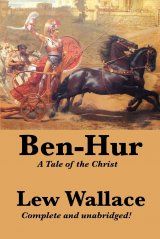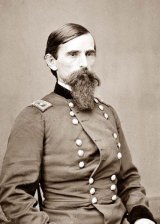Ben-Hur Page #3
Ben-Hur: A Tale of the Christ is a novel by Lew Wallace, published by Harper and Brothers on November 12, 1880, and considered "the most influential Christian book of the nineteenth century". It became a best-selling American novel, surpassing Harriet Beecher Stowe's Uncle Tom's Cabin in sales.
entertainment--the number he was awaiting. All was now ready. He stepped out: lo! in the east a dark speck on the face of the desert. He stood as if rooted to the ground; his eyes dilated; his flesh crept chilly, as if touched by something supernatural. The speck grew; became large as a hand; at length assumed defined proportions. A little later, full into view swung a duplication of his own dromedary, tall and white, and bearing a houdah, the travelling litter of Hindostan. Then the Egyptian crossed his hands upon his breast, and looked to heaven. "God only is great!" he exclaimed, his eyes full of tears, his soul in awe. The stranger drew nigh--at last stopped. Then he, too, seemed just waking. He beheld the kneeling camel, the tent, and the man standing prayerfully at the door. He crossed his hands, bent his head, and prayed silently; after which, in a little while, he stepped from his camel's neck to the sand, and advanced towards the Egyptian, as did the Egyptian towards him. A moment they looked at each other; then they embraced--that is, each threw his right arm over the other's shoulder, and the left round the side, placing his chin first upon the left, then upon the right breast. "Peace be with thee, O servant of the true God!" the stranger said. "And to thee, O brother of the true faith!--to thee peace and welcome," the Egyptian replied, with fervor. The new-comer was tall and gaunt, with lean face, sunken eyes, white hair and beard, and a complexion between the hue of cinnamon and bronze. He, too, was unarmed. His costume was Hindostani; over the skull-cap a shawl was wound in great folds, forming a turban; his body garments were in the style of the Egyptian's, except that the aba was shorter, exposing wide flowing breeches gathered at the ankles. In place of sandals, his feet were clad in half-slippers of red leather, pointed at the toes. Save the slippers, the costume from head to foot was of white linen. The air of the man was high, stately, severe. Visvamitra, the greatest of the ascetic heroes of the Iliad of the East, had in him a perfect representative. He might have been called a Life drenched with the wisdom of Brahma--Devotion Incarnate. Only in his eyes was there proof of humanity; when he lifted his face from the Egyptian's breast, they were glistening with tears. "God only is great!" he exclaimed, when the embrace was finished. "And blessed are they that serve him!" the Egyptian answered, wondering at the paraphrase of his own exclamation. "But let us wait," he added, "let us wait; for see, the other comes yonder!" They looked to the north, where, already plain to view, a third camel, of the whiteness of the others, came careening like a ship. They waited, standing together--waited until the new-comer arrived, dismounted, and advanced towards them. "Peace to you, O my brother!" he said, while embracing the Hindoo. And the Hindoo answered, "God's will be done!" The last comer was all unlike his friends: his frame was slighter; his complexion white; a mass of waving light hair was a perfect crown for his small but beautiful head; the warmth of his dark-blue eyes certified a delicate mind, and a cordial, brave nature. He was bareheaded and unarmed. Under the folds of the Tyrian blanket which he wore with unconscious grace appeared a tunic, short-sleeved and low-necked, gathered to the waist by a band, and reaching nearly to the knee; leaving the neck, arms, and legs bare. Sandals guarded his feet. Fifty years, probably more, had spent themselves upon him, with no other effect, apparently, than to tinge his demeanor with gravity and temper his words with forethought. The physical organization and the brightness of soul were untouched. No need to tell the student from what kindred he was sprung; if he came not himself from the groves of Athene', his ancestry did. When his arms fell from the Egyptian, the latter said, with a tremulous voice, "The Spirit brought me first; wherefore I know myself chosen to be the servant of my brethren. The tent is set, and the bread is ready for the breaking. Let me perform my office." Taking each by the hand, he led them within, and removed their sandals and washed their feet, and he poured water upon their hands, and dried them with napkins. Then, when he had laved his own hands, he said, "Let us take care of ourselves, brethren, as our service requires, and eat, that we may be strong for what remains of the day's duty. While we eat, we will each learn who the others are, and whence they come, and how they are called." He took them to the repast, and seated them so that they faced each other. Simultaneously their heads bent forward, their hands crossed upon their breasts, and, speaking together, they said aloud this simple grace: "Father of all--God!--what we have here is of thee; take our thanks and bless us, that we may continue to do thy will." With the last word they raised their eyes, and looked at each other in wonder. Each had spoken in a language never before heard by the others; yet each understood perfectly what was said. Their souls thrilled with divine emotion; for by the miracle they recognized the Divine Presence. CHAPTER III To speak in the style of the period, the meeting just described took place in the year of Rome 747. The month was December, and winter reigned over all the regions east of the Mediterranean. Such as ride upon the desert in this season go not far until smitten with a keen appetite. The company under the little tent were not exceptions to the rule. They were hungry, and ate heartily; and, after the wine, they talked. "To a wayfarer in a strange land nothing is so sweet as to hear his name on the tongue of a friend," said the Egyptian, who assumed to be president of the repast. "Before us lie many days of companionship. It is time we knew each other. So, if it be agreeable, he who came last shall be first to speak." Then, slowly at first, like one watchful of himself, the Greek began: "What I have to tell, my brethren, is so strange that I hardly know where to begin or what I may with propriety speak. I do not yet understand myself. The most I am sure of is that I am doing a Master's will, and that the service is a constant ecstasy. When I think of the purpose I am sent to fulfil, there is in me a joy so inexpressible that I know the will is God's." The good man paused, unable to proceed, while the others, in sympathy with his feelings, dropped their gaze. "Far to the west of this," he began again, "there is a land which may never be forgotten; if only because the world is too much its debtor, and because the indebtedness is for things that bring to men their purest pleasures. I will say nothing of the arts, nothing of philosophy, of eloquence, of poetry, of war: O my brethren, hers is the glory which must shine forever in perfected letters, by which He we go to find and proclaim will be made known to all the earth.
Translation
Translate and read this book in other languages:
Select another language:
- - Select -
- 简体中文 (Chinese - Simplified)
- 繁體中文 (Chinese - Traditional)
- Español (Spanish)
- Esperanto (Esperanto)
- 日本語 (Japanese)
- Português (Portuguese)
- Deutsch (German)
- العربية (Arabic)
- Français (French)
- Русский (Russian)
- ಕನ್ನಡ (Kannada)
- 한국어 (Korean)
- עברית (Hebrew)
- Gaeilge (Irish)
- Українська (Ukrainian)
- اردو (Urdu)
- Magyar (Hungarian)
- मानक हिन्दी (Hindi)
- Indonesia (Indonesian)
- Italiano (Italian)
- தமிழ் (Tamil)
- Türkçe (Turkish)
- తెలుగు (Telugu)
- ภาษาไทย (Thai)
- Tiếng Việt (Vietnamese)
- Čeština (Czech)
- Polski (Polish)
- Bahasa Indonesia (Indonesian)
- Românește (Romanian)
- Nederlands (Dutch)
- Ελληνικά (Greek)
- Latinum (Latin)
- Svenska (Swedish)
- Dansk (Danish)
- Suomi (Finnish)
- فارسی (Persian)
- ייִדיש (Yiddish)
- հայերեն (Armenian)
- Norsk (Norwegian)
- English (English)
Citation
Use the citation below to add this book to your bibliography:
Style:MLAChicagoAPA
"Ben-Hur Books." Literature.com. STANDS4 LLC, 2025. Web. 5 Feb. 2025. <https://www.literature.com/book/ben-hur_1675>.








Discuss this Ben-Hur book with the community:
Report Comment
We're doing our best to make sure our content is useful, accurate and safe.
If by any chance you spot an inappropriate comment while navigating through our website please use this form to let us know, and we'll take care of it shortly.
Attachment
You need to be logged in to favorite.
Log In